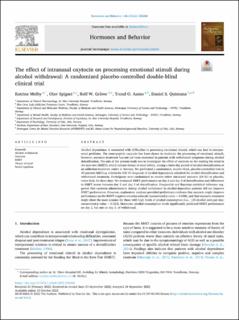| dc.contributor.author | Melby, Katrine | |
| dc.contributor.author | Spigset, Olav | |
| dc.contributor.author | Gråwe, Rolf W. | |
| dc.contributor.author | Aamo, Trond Oskar | |
| dc.contributor.author | Quintana, Daniel | |
| dc.date.accessioned | 2023-05-15T12:57:06Z | |
| dc.date.available | 2023-05-15T12:57:06Z | |
| dc.date.created | 2022-10-26T18:48:12Z | |
| dc.date.issued | 2022 | |
| dc.identifier.citation | Hormones and Behavior. 2022, 146 . | en_US |
| dc.identifier.issn | 0018-506X | |
| dc.identifier.uri | https://hdl.handle.net/11250/3067959 | |
| dc.description.abstract | Alcohol dependence is associated with difficulties in processing emotional stimuli, which can lead to interpersonal problems. The neuropeptide oxytocin has been shown to modulate the processing of emotional stimuli, however, oxytocin treatment has not yet been examined in patients with withdrawal symptoms during alcohol detoxification. The aim of the present study was to investigate the effect of oxytocin on the reading the mind in the eyes test (RMET), which indexes theory of mind ability, during a three-day period of alcohol detoxification at an addiction treatment centre in Norway. We performed a randomized, double-blind, placebo-controlled trial in 39 patients fulfilling criteria for ICD-10 diagnosis of alcohol dependence admitted for alcohol detoxification and withdrawal treatment. Participants were randomized to receive either intranasal oxytocin (24 IU) or placebo, twice daily for three days. We evaluated RMET performance on day 2 and day 3 of detoxification and differences in RMET scores between day 2 and day 3 of detoxification. Frequentist and Bayesian statistical inference suggested that oxytocin administration during alcohol withdrawal in alcohol-dependent patients did not improve RMET performance. However, exploratory analyses provided preliminary evidence that oxytocin might improve performance on the RMET negative emotion subscale (uncorrected p value = 0.038), and that oxytocin treatment might show the most promise for those with high levels of alcohol consumption (i.e., ≥20 alcohol units per day; uncorrected p value = 0.023). Moreover, alcohol consumption levels significantly predicted RMET performance on day 2, but not on day 3, of withdrawal. | en_US |
| dc.language.iso | eng | en_US |
| dc.publisher | Elsevier | en_US |
| dc.rights | Attribution-NonCommercial-NoDerivatives 4.0 Internasjonal | * |
| dc.rights.uri | http://creativecommons.org/licenses/by-nc-nd/4.0/deed.no | * |
| dc.title | The effect of intranasal oxytocin on processing emotional stimuli during alcohol withdrawal: A randomized placebo-controlled double-blind clinical trial | en_US |
| dc.title.alternative | The effect of intranasal oxytocin on processing emotional stimuli during alcohol withdrawal: A randomized placebo-controlled double-blind clinical trial | en_US |
| dc.type | Peer reviewed | en_US |
| dc.type | Journal article | en_US |
| dc.description.version | publishedVersion | en_US |
| dc.source.pagenumber | 5 | en_US |
| dc.source.volume | 146 | en_US |
| dc.source.journal | Hormones and Behavior | en_US |
| dc.identifier.doi | 10.1016/j.yhbeh.2022.105268 | |
| dc.identifier.cristin | 2065396 | |
| dc.relation.project | Norges forskningsråd: 324783 | en_US |
| cristin.ispublished | true | |
| cristin.fulltext | original | |
| cristin.qualitycode | 1 | |

